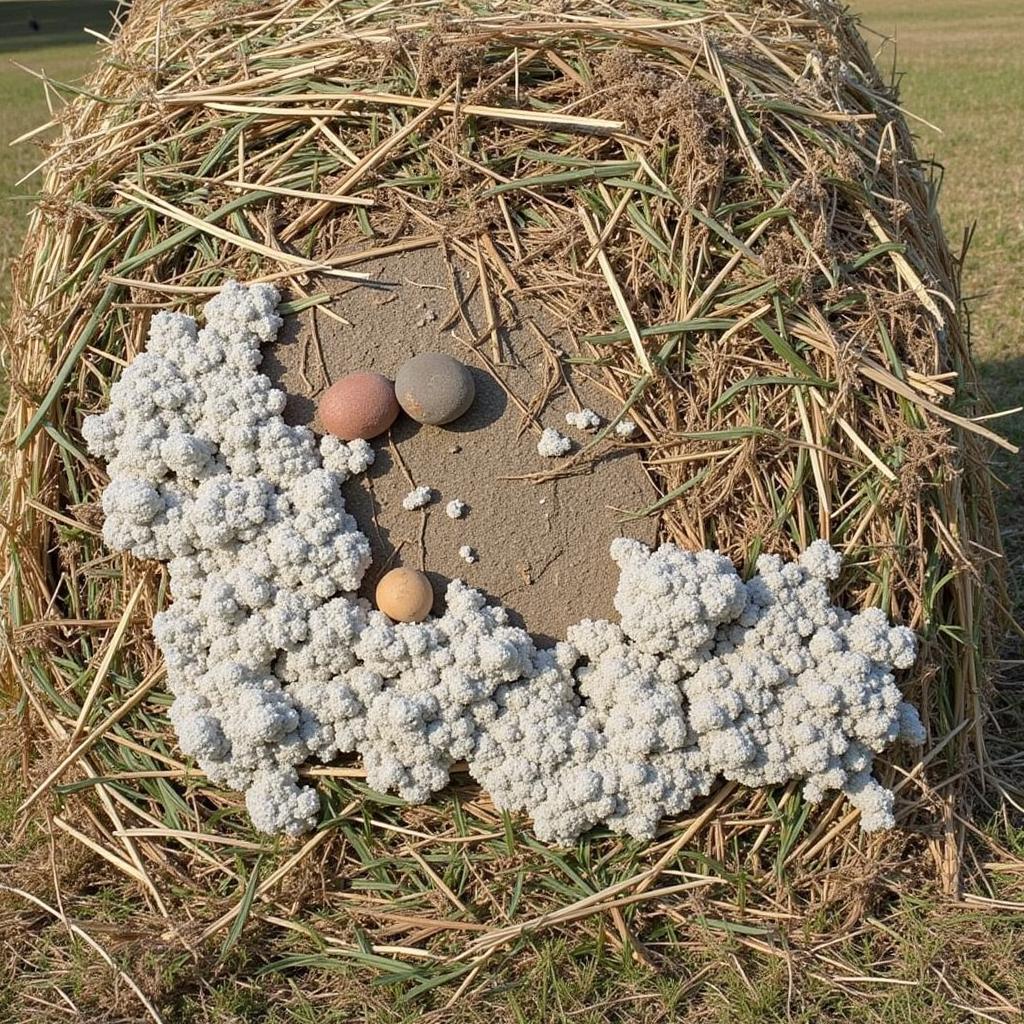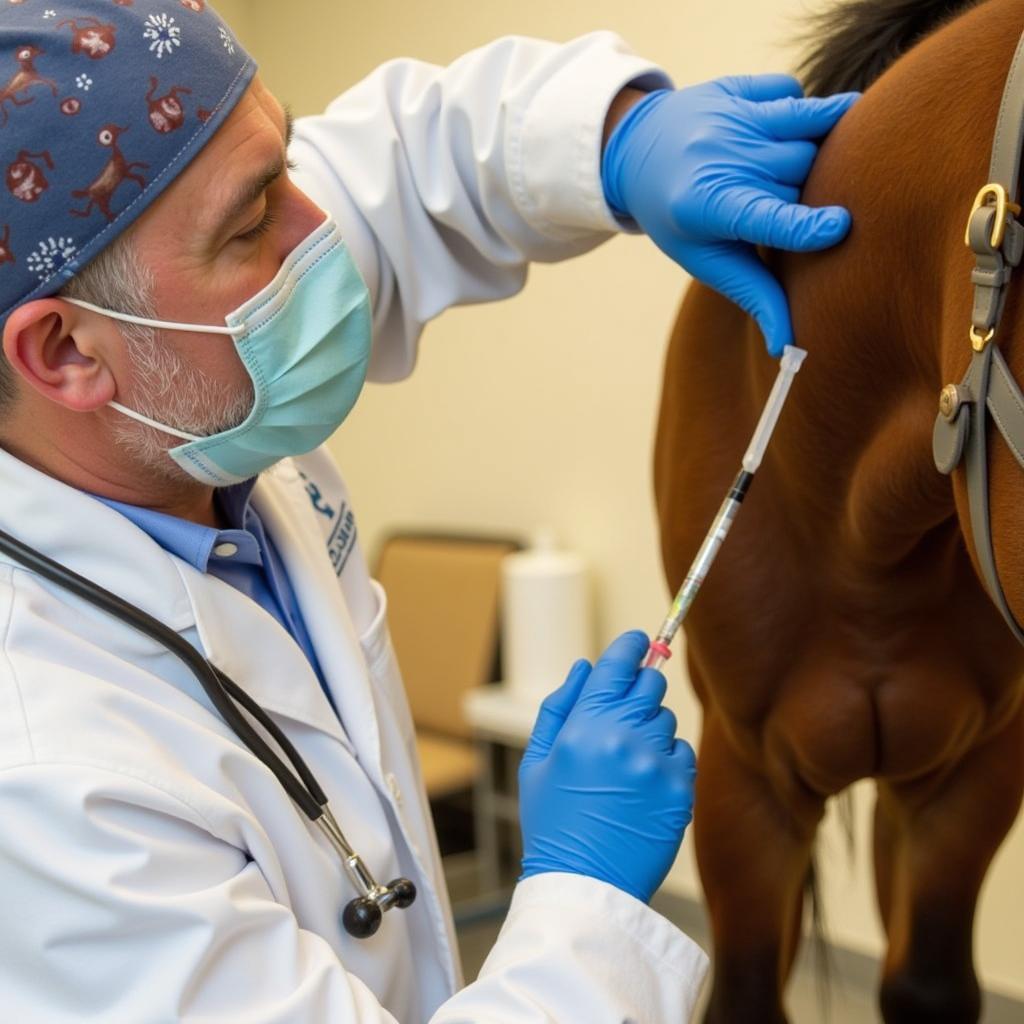Botulism in horses is a serious, potentially fatal neurological disease. Understanding the role of the Botulism In Horses Vaccine in protecting your equine companion is crucial. This guide will cover everything you need to know, from the causes and symptoms of botulism to the importance of vaccination and preventative measures.
Horses contract botulism through the ingestion of the neurotoxin produced by the bacterium Clostridium botulinum. This toxin disrupts nerve function, leading to muscle paralysis. The most common sources of the toxin are contaminated feed, water, or wounds. Even small amounts of the toxin can have devastating effects. Knowing the signs and taking preventative measures are vital for your horse’s well-being. Early vaccination is key to protecting your horse against this dangerous disease. Learn more about developing a comprehensive horse vaccination schedule tailored to your horse’s needs.
Understanding Botulism in Horses
Botulism is characterized by progressive muscle weakness, often starting with the head and neck. Symptoms can include difficulty swallowing, drooling, weak tongue tone, and wobbly gait. As the disease progresses, paralysis can affect the respiratory muscles, ultimately leading to death. Rapid diagnosis and treatment are crucial for survival.
Types of Botulism in Horses
There are several types of botulism, categorized by the specific toxin involved. Type B is the most common form affecting horses. Other types, like A and C, can also occur, but less frequently. Understanding the different types can help veterinarians tailor treatment strategies.
The Importance of the Botulism in Horses Vaccine
Vaccination is the most effective way to protect horses from botulism. The vaccine stimulates the horse’s immune system to produce antibodies against the botulinum toxin. This provides crucial protection against the devastating effects of the disease. While not 100% foolproof, vaccination significantly reduces the risk of botulism and its associated complications. Regular booster vaccinations, as advised by your veterinarian, are essential to maintain immunity. Consult our horse vaccine schedule for guidance on creating a comprehensive vaccination plan.
Prevention Beyond Vaccination
While the botulism in horses vaccine is essential, other preventative measures are equally crucial. These include careful management of feed and water sources, ensuring proper hygiene in stables and pastures, and prompt wound care.
Practical Prevention Tips
- Regularly inspect hay and feed for signs of spoilage or contamination.
- Ensure a clean and consistent water supply.
- Implement proper manure management to minimize bacterial growth.
- Practice diligent wound care to prevent infection.
 Contaminated Horse Feed
Contaminated Horse Feed
Recognizing and Responding to Botulism in Horses
If you suspect your horse is showing signs of botulism, immediate veterinary attention is critical. Early diagnosis and treatment can significantly improve the chances of survival. Treatment typically involves administering antitoxin and supportive care.
Key Symptoms to Watch For
- Difficulty swallowing or chewing
- Excessive drooling
- Muscle weakness and tremors
- Difficulty breathing
Frequently Asked Questions (FAQ)
- How often should my horse receive the botulism vaccine? Consult your veterinarian for a personalized schedule, but typically, initial vaccinations are followed by annual boosters.
- Is the botulism vaccine safe for all horses? Generally, yes. However, discuss any pre-existing conditions with your veterinarian before vaccination.
- Can foals be vaccinated against botulism? Yes, foals can be vaccinated, usually starting around six months of age. Check out our horse vaccination chart for more details.
- What should I do if I suspect my horse has botulism? Contact your veterinarian immediately. Time is of the essence in treating this serious condition.
- Besides vaccination, what else can I do to prevent botulism? Maintain a clean environment, ensure high-quality feed and water, and practice proper wound care.
- Can horses recover from botulism? Yes, with prompt treatment and supportive care, horses can recover, though the recovery period can be lengthy.
- Are there different types of botulism vaccines? Consult your veterinarian to determine the most appropriate vaccine for your horse based on regional risks and prevalence of different botulism types.
Conclusion
Botulism in horses is a severe and life-threatening disease. The botulism in horses vaccine is a crucial tool in protecting your horse. Combined with proactive preventative measures, vaccination provides the best defense against this devastating illness. Regular veterinary checkups and a well-planned horse vaccine schedule are vital for maintaining your horse’s health and well-being.
 Administering Botulism Vaccine to Horse
Administering Botulism Vaccine to Horse
“Botulism can be devastating, but with proper vaccination and management practices, it’s largely preventable,” says Dr. Emily Carter, DVM, specializing in equine internal medicine. “Don’t underestimate the importance of a consistent vaccination schedule and a clean environment.”
Dr. James Miller, DVM, an equine specialist with over 20 years of experience, adds, “Early diagnosis and treatment are critical when dealing with botulism. Knowing the symptoms can mean the difference between life and death for your horse.”
Need help developing a vaccination strategy for your horse? Contact us at Phone: 0772127271, Email: [email protected] or visit us at QGM2+WX2, Vị Trung, Vị Thuỷ, Hậu Giang, Việt Nam. Our team is available 24/7 to assist you.